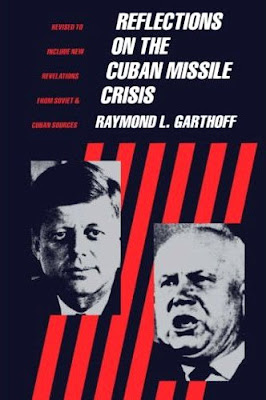
With an ongoing interest in this major confrontation of the cold war we were excited to receive a copy of Reflections on the Cuban Missile Crisis by Raymond Garthoff. This was a rare insightful read from an informed revisionist.
ISBN: 0815730535
Price: £9.95
Publication Date: 1989
Raymond Garthoff's Reflections on the Cuban Missile Crisis is a reflective memoir by a Soviet specialist in the State Department in 1962. Garthoff's book draws on his own recollections, declassified documents and scholarly sources. He does not detail the background or the development of the crisis; rather he attempts to analyze the Soviet understanding of the crisis and the lessons they may have drawn from the experience. According to Garthoff, the primary Soviet motive for introducing nuclear missiles into Cuba was an attempt to change the strategic balance of power. They were not bargaining chips to settle the Berlin problem; they were not there to defend Castro. He rejects the contention that the conclusion of the missile crisis led the Soviet Union to increase immediately its military power; there was no "crash" program to accelerate military power. While the Soviet Union did later develop rough parity with the United States, it was not a direct result of the missile crisis.
Garthoff maintains that the short term consequences were positive in that the crisis did lead to detente and to arms control; it ended any new flare up about Berlin; and it ended the threat of an American invasion of Cuba. While American foreign policy remained hostile to Cuba, the missile crisis initiated a belief in Washington that the United States had to accept the fact that Castro and communism would remain in Cuba. Garthoff concludes his reflections with an analysis of what he believes is the long-term legacy for the Soviets. The Soviets learned: 1) not to bluff, 2) not to challenge an adversary who is stronger and 3), most importantly, to avoid crises. Crisis avoidance is better than crisis management; political accommodation is possible and preferable to crisis management. Since no crisis of the magnitude of October 1962 has occurred between the United States and the Soviet Union, Garthoff concludes that both sides had learned this lesson.
Garthoff maintains that the short term consequences were positive in that the crisis did lead to detente and to arms control; it ended any new flare up about Berlin; and it ended the threat of an American invasion of Cuba. While American foreign policy remained hostile to Cuba, the missile crisis initiated a belief in Washington that the United States had to accept the fact that Castro and communism would remain in Cuba. Garthoff concludes his reflections with an analysis of what he believes is the long-term legacy for the Soviets. The Soviets learned: 1) not to bluff, 2) not to challenge an adversary who is stronger and 3), most importantly, to avoid crises. Crisis avoidance is better than crisis management; political accommodation is possible and preferable to crisis management. Since no crisis of the magnitude of October 1962 has occurred between the United States and the Soviet Union, Garthoff concludes that both sides had learned this lesson.

Post a Comment